|
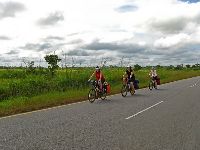 North of Lunsar the
terrain is flat and often good for paddy or swamp rice. The Temne area is
one of the bread-baskets of Sierra Leone. Prior to the civil war, Sierra
Leone was a net rice exporter. During the civil war rice production
eventually North of Lunsar the
terrain is flat and often good for paddy or swamp rice. The Temne area is
one of the bread-baskets of Sierra Leone. Prior to the civil war, Sierra
Leone was a net rice exporter. During the civil war rice production
eventually
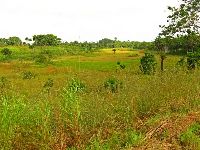 fell
to about twenty percent of its pre-war levels. After peace returned
in 2002 rice
production began to rebounded. In 2010, the country should be back to
self-sufficiency, about 80% of pre-war levels and after that they should be able
to start exporting again. So far, once away from the
coast, all of the rice that we have been served has been freshly harvested, local rice. It is rice
harvest season now. fell
to about twenty percent of its pre-war levels. After peace returned
in 2002 rice
production began to rebounded. In 2010, the country should be back to
self-sufficiency, about 80% of pre-war levels and after that they should be able
to start exporting again. So far, once away from the
coast, all of the rice that we have been served has been freshly harvested, local rice. It is rice
harvest season now.
Freshly harvested and 'country rice' from Sierra Leone is a real treat. It
has as rich a flavor as buttered rice, but without the butter. It has a
distinctively different taste from imported, polished, white rice that has been
in a warehouse and / or boat for months.
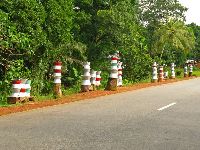 Traveling along the Lunsar-Makeni road, it is interesting how different villages have
different production specialties. In one village it might be pounded metal
Traveling along the Lunsar-Makeni road, it is interesting how different villages have
different production specialties. In one village it might be pounded metal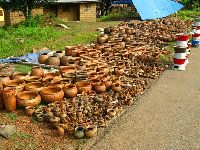 charcoal cookers (left), in one village is will be all ceramic pots (right) and
in another village it might be baskets. Or sometimes it is a whole series
of village that all compete with the same commodity.
charcoal cookers (left), in one village is will be all ceramic pots (right) and
in another village it might be baskets. Or sometimes it is a whole series
of village that all compete with the same commodity.
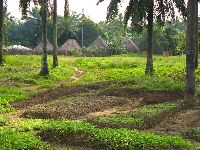
Each mile along the way the scenery continues to change and continues to be interesting.
There were sections of forest, sections of farms, oil palm estates, and clusters
of houses with gardens (left). The changing scenery also provide a
changing set of people to greet, watch and muse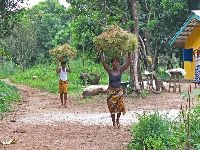 about. Some of the activity is pretty clear; students going to and coming
from school, and farmers harvesting their rice and carrying it from the farm to
the village. Other people headed off busy and
about. Some of the activity is pretty clear; students going to and coming
from school, and farmers harvesting their rice and carrying it from the farm to
the village. Other people headed off busy and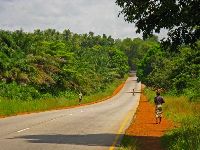 clearly with a purpose, but on a mission and to destination that we could often
only speculate about. It provided a constant stream of images and
information to think about. No one moved too fast, maybe that was a
concession to the climate, but things were progressing.
clearly with a purpose, but on a mission and to destination that we could often
only speculate about. It provided a constant stream of images and
information to think about. No one moved too fast, maybe that was a
concession to the climate, but things were progressing.
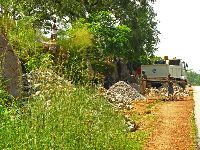 The
roughest job of the day that we saw was stone breaking (left). Big boulders were
chiseled out of the hillside -- by hand. The boulders were broken down
to big rocks -- by hand. The big rocks were broken into smaller rocks
-- by hand. And so it went until a man sat and pounded fist size rocks
into gravel -- by hand. Some of the workers had managed to arrange
some shade The
roughest job of the day that we saw was stone breaking (left). Big boulders were
chiseled out of the hillside -- by hand. The boulders were broken down
to big rocks -- by hand. The big rocks were broken into smaller rocks
-- by hand. And so it went until a man sat and pounded fist size rocks
into gravel -- by hand. Some of the workers had managed to arrange
some shade for themselves, but many work directly under the sun.
for themselves, but many work directly under the sun.
The big road and building construction projects had big mechanical rock crushers
to prepare their materials. It was hard to image how there was still a
place in the economy that paid a living wage for breaking rocks by hand.
The coast of a pile of stones could only have been a few dollars and it would
take days of labor to make one pile of stones. My arms ached at the
thought of it.
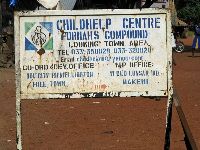
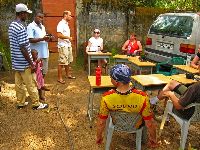
In Makeni we stopped at a local non-governmental organization (NGO),
ChildHelp Sierra Leone,
 to learn about the
community and hear about there program. One of their focuses is to get to learn about the
community and hear about there program. One of their focuses is to get
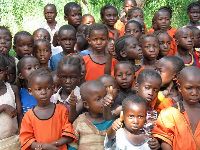 non- non- attending,
school-aged children in school (partially to insure that the children weren't
exploited as child labor. They are providing some support to primary
schools in attending,
school-aged children in school (partially to insure that the children weren't
exploited as child labor. They are providing some support to primary
schools in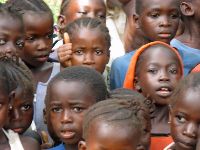
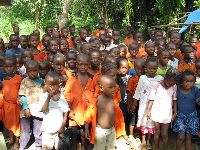 communities that
previously didn't have schools and the have established a school for orphans,
who often have additional needs from those of students living with their
families. communities that
previously didn't have schools and the have established a school for orphans,
who often have additional needs from those of students living with their
families.
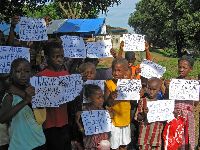
We weren't the first guest to visit the schools. Both schools had prepared
welcome song to greet us as we arrived. At one school, in addition to the
rehearsed welcome song, they had prepared signs describing their situation: "We
need teach materials." "We need food." "We need medical supplies and
school books." The signs were great for communicating given our
groups proclivity
for taking photos. Other signs welcomed us, thanked us for visiting them
and blessed our journey.
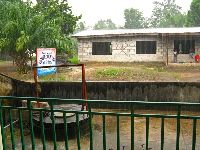 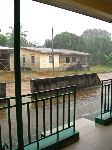 While
the skies were sunny, with varying degrees of broken clouds during our ride
and tour of town, about
an hour before sunset the clouds quickly thickened up and dumped buckets of rain for about
twenty minute. The downpour ceased as quick as it started and the
evening sky was dry. While
the skies were sunny, with varying degrees of broken clouds during our ride
and tour of town, about
an hour before sunset the clouds quickly thickened up and dumped buckets of rain for about
twenty minute. The downpour ceased as quick as it started and the
evening sky was dry.
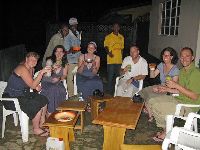 After dinner
there was a wine tasting of fresh local palm wine. The wine received
generally positive reviews, though no one seemed particularly ecstatic about
it. After dinner
there was a wine tasting of fresh local palm wine. The wine received
generally positive reviews, though no one seemed particularly ecstatic about
it.
|




















